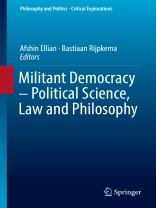This volume offers an up-to-date overview of the much-debated issue of how a democracy may defend itself against those who want to subvert it. The justifications, effectiveness and legal implications of militant democracy are discussed by addressing questions as: How can militant democracy measures such as party bans be justified? Why is it that some democracies ban antidemocratic parties? Does militant democracy succeed in combatting right-wing extremism? And is militant democracy evolving into an internationalized legal and political concept?
สารบัญ
Introduction.- Part 1 – Political Science.- Militant Democracy and the Banning of Political Parties in Democratic States: Why some do and some don’t; Angela K. Bourne.- Frail Democracy; Ivan Ermakoff.- How does Militant Democracy function in combating Right-Wing Extremism? A Case Study of Slovakian Militant Democracy and the rise of Kotleba – People’s Party Our Slovakia; Miroslav Mareš.- Part 2 – Law.- Interactions between International and National Norms: Towards an Internationalized Concept of Militant Democracy; Christian Walter.- Justifying Militant Democracy: Philosophical and Legal Reflections on Dutch Militant Democracy; Gelijn Molier.- Part 3 – Philosophy.- Militant democracy beyond Loewenstein: George van den Bergh’s 1936 inaugural lecture; Bastiaan Rijpkema.- Amour de la Démocratie versus the Dictatorship of the Constitutional State: the Defence in Democracy Itself; Afshin Ellian.- Index.
เกี่ยวกับผู้แต่ง
Prof. dr. Afshin Ellian (1966) is Professor of Jurisprudence at Leiden University. He received his Ph D in 2003 at Tilburg University with a dissertation on the democratic transition of South Africa. Ellian wrote extensively on topics within legal and political philosophy, such as: religious extremism, the state of exception, militant democracy and (counter)terrorism. His latest publications are Freedom of Speech under Attack, edited with Gelijn Molier (Eleven Publishing, 2015), and Legaliteit en Legitimiteit: de grondslagen van het recht (Legality and Legitimacy: the foundations of law), co-authored with Paul Cliteur (Leiden University Press, 2016). His op-eds were published in leading Dutch newspapers such as NRC Handelsblad and international titles as The Wall Street Journal and Le Figaro.
Bastiaan Rijpkema Ph D (1987) is Assistant Professor at the Department of Jurisprudence at Leiden University. He received his LL.B. in Law at Erasmus University Rotterdam (2010) and his LL.M. in Jurisprudence and Philosophy of Law (cum laude) from Leiden University (2011). In 2015 he obtained his Ph D at Leiden University with a dissertation on militant democracy. His main interests lie in the fields of legal and political philosophy, especially democracy, extremism and free speech. In 2014 he co-authored a new edition of the 1936 inaugural lecture of Amsterdam constitutional scholar George van den Bergh on antidemocratic parties (Elsevier Books), for which he wrote an extensive introduction. His dissertation was published as Weerbare democratie: de grenzen van democratische tolerantie (Militant Democracy: The Limits of Democratic Tolerance) and was reviewed in major Dutch and Belgian newspapers. Rijpkema is a regular commentator on politics for the Dutch Radio 1 and published several op-eds on national and international politics. He is also frequently invited for expert meetings held by the Dutch government, for instance with Deputy Prime Minister Lodewijk Asscher and the Dutch Coordinator for Security and Counterterrorism.












